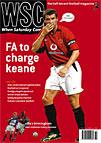 Kasper Steenbach recounts Brian Laudrup's short and unhappy spell at Chelsea in 1998
Kasper Steenbach recounts Brian Laudrup's short and unhappy spell at Chelsea in 1998
Overall, Brian Laudrup is today a happy man – he lives with his family at an exclusive address on the coast north of Copenhagen and turns out as a striker for the local amateur team. The chief executive of FC Copenhagen, Flemming Østergaard, is also happy. He heads virtually the only European club that is presently increasing in value on the stock market. Since he took over in 1997, the club has been turned into a big name in the entertainment business, having hosted the Eurovision Song Contest and a Mike Tyson fight. And, above all, he runs a club that has succeeded in attracting the support of most football fans in Copenhagen for the first time in recent history.
Nevertheless, there is one person who can ruin Flemming Østergaard’s mood by the mere mention of his name. That person is Brian Laudrup, who, conversely, has little positive to say about Østergaard. In fact, the disputes between the two involved allegations of share trading irregularities that might even have brought about the end of FC Copenhagen.
It all began in Gianluca Vialli’s flat in Kensington in February 1998. Chelsea had overcome fierce competition from Ajax and the ambitious FC Copenhagen to sign Laudrup, who would be free from his contract with Rangers after that summer’s World Cup. Laudrup had discussed a move on the phone with Chelsea’s then manager Ruud Gullit. But at that February meeting, at which Chelsea’s managing director Colin Hutchinson was also present, he was informed that Vialli was about to become the new Chelsea boss.
The three also discussed Gullit’s heavily criticised squad rotation system. Laudrup was an avid opponent of the system and so, he was told, was Vialli, who had been one of its chief victims under Gullit. Laudrup signed for Chelsea, but subsequently came to suspect that the club’s management had used his transfer as a diversionary tactic while they prepared to fire Gullit.
Laudrup signed up with Chelsea while he still had several months left on his deal with Rangers, primarily because he didn’t want to wait until the summer holidays to sort out his children’s schooling and the family’s housing situation. But he was in some turmoil about his future and very quickly came to regret the decision. A few days before the Danish national team went off to the World Cup training camp in France, Laudrup contacted Hutchinson and asked to be released from his contract.
Hutchinson responded by saying that Chelsea would not hesitate to go to court or involve FIFA and UEFA if the contract wasn’t honoured. Laudrup got the message and, in truth, recognised that Hutchinson didn’t have much option unless he was prepared to risk seeing Laudrup move to another club without a fee. So, on July 1, 1998, after a successful World Cup, he joined Chelsea’s multinational squad.
Mentally, however, he would never be a Chelsea player. The Laudrup family never managed to settle properly in London, while there was unrest among Vialli’s squad, unhappy that he had, after all, persisted with the rotation system. Not that they were divided – on the contrary, Laudrup found them more united than at several other clubs he had played at. But not in support of the coach.
In October, Laudrup approached Østergaard to discuss a move to FC Copenhagen who, coincidentally, had been drawn against Chelsea in the Cup-Winners Cup second round. Hutchinson again stood his ground, which angered Laudrup: “Now they were in a situation where they could actually make some money off me, and they hadn’t paid a penny for me. I thought it was despicable that they wanted to hold on to me.”
Negotiations continued between the two legs (Laudrup scored the only goal in Copenhagen to send Chelsea through 2-1 on aggregate). Finally it was agreed that FC Copenhagen would pay three instalments of £400,000, with a further £4 million being due to Chelsea if Laudrup were sold on to a third team during the two and a half years of his contract.
On November 6, 1998 the parties signed a contract at Brian Laudrup’s London flat. What happened that day has since become an issue for the Danish stock exchange, and even the police’s white collar crime division. A clause was added to the deal which would allow Laudrup to revoke his contract with FC Copenhagen at any time. After a few months back in Denmark, he did just that, prompted by press criticism of his performances and worsening relations between himself and Østergaard.
When Laudrup made use of the clause, his contract reverted to Chelsea. As a result, the club never received the last two instalments of the fee due from Copenhagen, but they subsequenly sold the player to Ajax for an unknown amount in the summer of 1999. The problem was that Østergaard had neglected to inform the stock exchange about the clause. The fans, who by then had bought thousands of Laudrup jerseys, were also not aware of the loophole nor, it seems, was Østergaard’s own board of directors at FC Copenhagen.
The matter has never resulted in any consequences for Flemming Østergaard, beyond an ambiguous reprimand by the Danish stock exchange. Østergaard has not publicly commented on the matter since but he continues to believes that he did the sensitive Brian Laudrup a favour by bringing him home. Brian Laudrup, needless to say, does not share that view.
From WSC 188 October 2002. What was happening this month